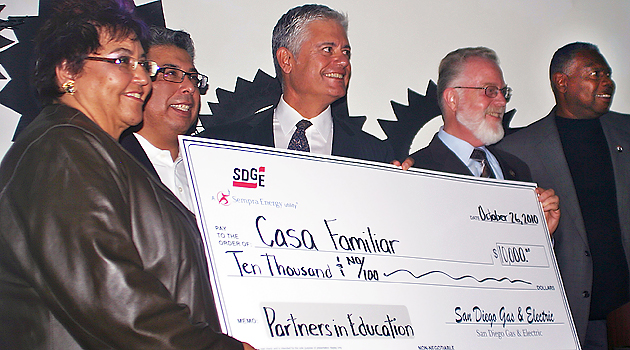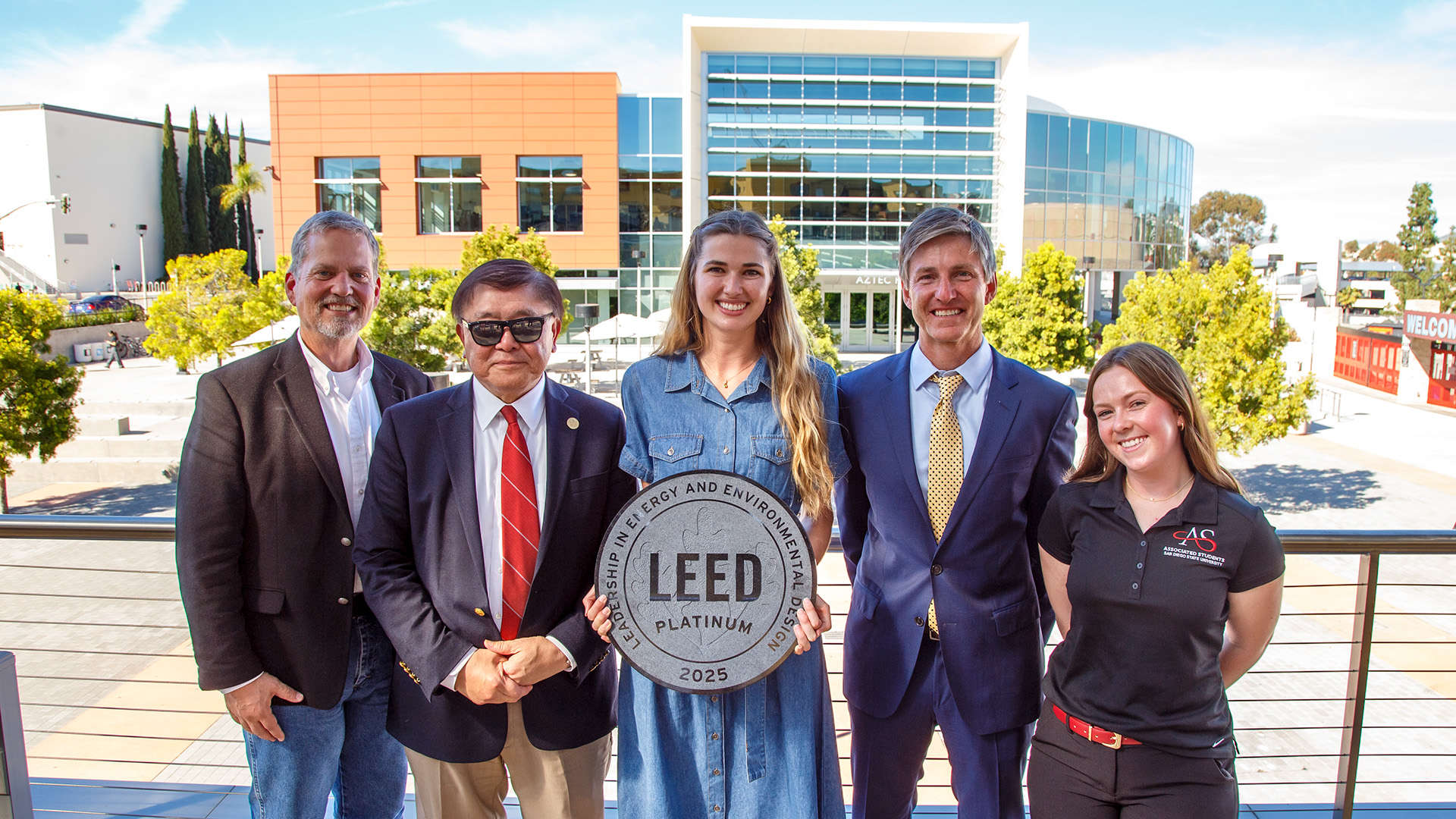Casa Azteca Program Comes to SDSU
Student Affairs partners with Casa Familiar to support SDSU students from San Ysidro.

San Diego State University has embarked on a bold collaborative project with the nonprofit community group, Casa Familiar, to support and encourage SDSU students living in the community of San Ysidro.
Called the Casa Azteca program, the purpose is to provide a comprehensive array of services and programs to increase academic success for commuter students and provide early outreach.
A kick-off event for Casa Azteca was held on Oct. 26 at The Front, Casa Familiar’s neighborhood arts, culture and community development center. More than 100 San Ysidro students and parents joined SDSU’s top administrators, community leaders and corporate partners for an inspirational evening of hope.
Providing opportunity
SDSU President Stephen L. Weber shared why a program like Casa Azteca is so important to him and to society.
“Since coming to San Diego State, we have worked hard to ensure that first-generation students have every opportunity to succeed and prosper in a university setting,” he said.
“In nine out of ten of the nation’s largest cities, Latinos comprise the largest portion of the population. The Latino community will inherit San Diego. We must make sure that San Diego works for everybody, and that starts with education.”
Business leaders also see this need. Frank Urtasun, director of community relations at San Diego Gas & Electric and an SDSU alumnus, presented a $10,000 check in support of Casa Azteca.
“Our donation will help strengthen what students learn at home and school, and keep them on track to graduate from college en route to a great future. We are proud to be supporters of this effort,” Urtasun said.
“This is personal to me, as I grew up two blocks from here. Education was something we knew could improve our lives economically and socially, but I did not know how I was going to get to college, being the son of immigrants.”
Urtasun said he was the first in his family to attend and graduate from college.
“I wish a program like Casa Azteca existed when I was young,” he said. “When Casa Familiar called me to discuss the program, I knew I had to help.”
CitiBank also provided a business incentive for the community. Gustavo Bidart, a vice president and regional manager of community development, and a past chairman of Casa Familiar, announced to the parents in attendance an “Asset Building Program” that Citi has developed for them.
“You establish a savings account at our bank, and for every dollar you save, it will be matched,” he said. “You’ll be able to save for a house and for your child’s education. We are planning to launch this in the first quarter next year.”
Program's importance
Research consistently shows that students who live on campus, especially first-generation, low-income Latino students, are more academically successful than students who commute to school.
The community of San Ysidro is hit particularly hard: from the fall 2006 student cohort, 65 percent of San Ysidro SDSU students ended up on academic probation during their first semester, and only 58 percent continue to their sophomore year, compared to 80 percent of the general population of freshmen. Most San Ysidro students cannot afford to live on campus, and commute, often via the trolley.
The purpose of Casa Azteca is to provide the educational support services to commuter students that on-campus students receive in the residence halls. According to Student Affairs Associate Vice President Eric Rivera, it is clear that it is the on-campus residential services that make the difference for our Latino students.
“We’re basing Casa Azteca on our learning communities model,” he said.
“Having a small group that becomes a community, exploring values and goals, developing a vision for life and providing academic support through tutoring and mentoring all translate to academic success. The data consistently supports this. So we asked the question: ‘how can we leverage what we know works and reach out to the community?’ And teaming with Casa Familiar was the way to start this.”
A holistic approach
SDSU and Casa Familiar joined forces with the local school district to enhance the expertise that each group provides in order to create a true college-going culture. According to Vice President for Student Affairs James R. Kitchen, Casa Familiar has a holistic approach to education in San Ysidro, starting from pre-school, while incorporating the basic human services needs of the community such as health care, housing and cultural needs.
“The scope of what Casa Familiar provides in San Ysidro is amazing,” Kitchen said. “They house 1,100 families, provide advocacy, health services and financial literacy. I’m excited about this partnership because it has such great potential to make a huge difference in the community.”
Andrea Skorepa, the chief executive officer of Casa Familiar, spoke eloquently about the importance of education in the Latino culture.
“Our philosophy is that to love your child is to educate him or her,” she said. “The Spanish definition of education is two-fold: there is the institutional form of education, but there is also the standards, traditions, ethics, values and morals that we impart upon our children. I see Casa Azteca as an extension of that definition of education.”



